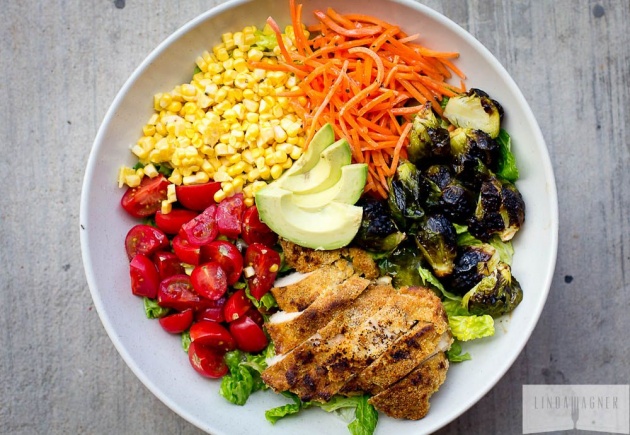Eating healthy does not have to be difficult. In fact, if you develop a routine of adopting positive healthy practices, which you engage in regularly, eating healthfully can become second nature. Consider brushing your teeth. Most of us regularly brush our teeth so the practice has become easy to sustain on a regular basis. That is the goal of developing healthy eating habits. I teach clients to engage in a few practices regularly until they become second nature, and it feels unnatural not to do them.

As most of you know, I am not a fan of diets. The reason is that we follow a certain diet for a while, and then we fall off the wagon as we are unable to sustain it, and so often, end up discouraged. Better to adopt a healthy lifestyle you can sustain for the long haul.
One key, however, in adopting healthy habits is to know yourself. As bestselling author of the upcoming book on habits, Better Than Before, Gretchen Rubin says, "I've realized that the secret to good habits -- for nutrition, or anything else -- is to know yourself. For instance, some people do better when they give up a temptation all together, others when they indulge in moderation ... You have to think about what works for you."
Here are eight simple healthy habits which will help you to lead a healthier lifestyle.
1. Stock up on healthy foods.
We tend to eat what we buy and keep around the house. It is, therefore so important to stock up on healthy foods. Keep fresh fruit and veggies handy which you can grab and eat easily -- baby carrots, apples, pears, berries. Buy whole grains instead of white bread products -- oatmeal, brown rice, and whole wheat breads. Keep healthy protein options around -- nuts and seeds, fresh turkey breast, and eggs. Try not to keep soda, cookies, and sugary cereals around.
2. Eat sitting down.
When you eat meals while you are sitting down, you tend to eat more slowly, enjoy what you are eating, and may even end up eating less. When you eat standing, you often do not even realize that you are eating. If you want a scoop of ice cream, instead of eating straight from the pint (and wolfing down the whole pint), place a portion in a bowl, sit down, and enjoy it. It's also great to eat with others and enjoy the social experience of dining.
3. Drink water instead of liquid calories.
Limiting liquid calories -- soda, sweetened drinks, fruit juice -- is one of the simplest ways to cut out calories and sugar. Sweetened drinks like soda provide no nutritional value and are just empty calories. Diet sodas also provide no nutritional value, taste too sweet, and do not help most of us lose weight. So why even bother drinking them? Instead, get into the habit of opting for water or flavored seltzers. They will keep you hydrated without providing any calories. Try drinking a glass of water before eating each meal or snack, and you may just end up eating less.
4. Snack on fruit instead of chips.
It really is pretty easy to eat fruit if you keep it handy. Opt for a variety of fresh fruit in season, and plan for it. So often, we grab a bag of chips because it is convenient. Choosing fruit can also be convenient, if we set it up that way. The trick is to either know where to get fruit if you are out, or to stock it in your fridge, and bring it along if you are going to be out all day. Throw an apple in your bag on your way to work; this will help to ensure that you eat it if you need a mid-morning snack. Also choose a fruit with breakfast. Throw a handful of berries into your yogurt or oatmeal or have a piece of melon when in season. Fruit also makes a great after dinner snack.
5. Eat a colorful salad -- or veggies -- each day.
Eating salads are a great way to get a variety of nutrients without too many calories. (Of course, that means" dressing on the side.") The different colors of vegetables impart different nutrients, so it's best to choose a colorful variety. And fill up on what you like -- you've got enough to choose from. Several top picks include romaine lettuce, kale or spinach topped with a colorful assortment of tomatoes, carrots, red peppers, beets, mushrooms, or cucumbers. If you don't love salads or are not in the mood, another way to get your veggies is to have a vegetable-based soup or to eat steamed or sautéed dressing. You will still get so many of the healthy nutrients including antioxidant vitamins A and C, potassium, fiber, and more.
6. Chew your food well.
When we chew our food and pay attention to what we are eating, we eat more slowly, and usually end up eating less. It takes at least 15 minutes for our bodies to register that we are full. Also, our eyes tend to be bigger than our stomach, and when we eat quickly, we often tend to eat too much and end up feeling uncomfortable and stuffed.
7. Put leftovers away.
Leaving leftovers sitting out on the counter signals "eat me." It is so hard to resist temptation when food is just sitting around. Why tempt yourself?
8. To thyself be true.
It is so important to know yourself and recognize what works -- and what doesn't work -- for you. I've counseled many different types of clients over the years, and some need an after dinner-treat while others end up overeating if they have one small cookie or piece of chocolate. In an email, Gretchen wrote me the following: "My sister's Kryptonite is French fries, so she gave them up altogether -- that was easier for her. But some people feel rebellious if they can't have that one square of chocolate every day, and if that describes you, keep a chocolate bar in your desk drawer."
So, take some time to reflect on what you like and on what works for you.



